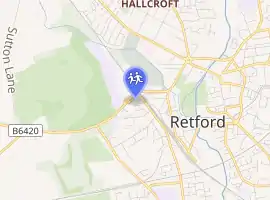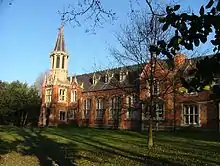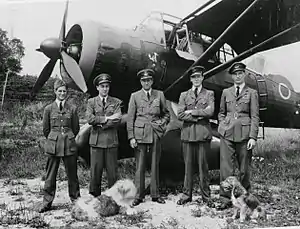Retford Oaks Academy
Retford Oaks Academy is a coeducational secondary school and sixth form located in the market town of Retford, Nottinghamshire, England, situated in the (mainly former) coal-mining district of Bassetlaw.
| Retford Oaks Academy | |
|---|---|
| Address | |

| |
Babworth Road , , DN22 7NJ England | |
| Coordinates | 53°19′15″N 0°57′26″W |
| Information | |
| Type | Academy |
| Motto | Dedicated to excellence |
| Established | 2003 |
| Department for Education URN | 137117 Tables |
| Ofsted | Reports |
| Gender | Coeducational |
| Age | 11 to 18 |
| Houses | Clumber Rufford Sherwood Thorseby |
| Colour(s) | Green Black Gold White |
| Former names | King Edward VI School, Ordsall Hall School, Sir Frederick Milner Secondary Modern, Retford Oaks High School |
Academic performance
The school has improved from a poor starting point since opening in 2003. The number of students achieving 5 or more A* to C grades at GCSE has risen from 20% in 2006 to 49% in 2011. The opening of the separate sixth form centre with The Elizabethan Academy, effectively operating as a sixth form college, has produced A level results above the England average.
Ofsted
Retford Oaks has maintained a grading of "satisfactory" in its recent inspections although with several areas classed as good.[1]
History
The school was established in 2003 with the amalgamation of two of the schools in Retford. His Royal Highness, The Duke of Kent formally opened the school in October 2008. In September 2009 the school was designated as a specialist sports college with its second subject being Mathematics. In September 2011 the school officially became academy as part of the Diverse Academies Learning Partnership - a collaboration of three academies, Tuxford Academy, National C of E academy and Retford Oaks.
Older schools: King Edward VI Grammar School and the Girls' High School
The King Edward VI School was on London Road. It was previously known as the King Edward VI Grammar School and the oldest part of the school buildings (opened in August 1857) was designed by Decimus Burton. The Grammar School magazine was called The Retfordian. The school motto was Ex Pulvere Palma. In later years the school's senior houses were Edward, Foljambe, Gough, and Overend. The junior houses were Bescoby, Darrell, Laycock, and Mason (all named after school benefactors).
The school usually traced its original foundation back to Thomas Gunthorpe of Babworth in 1519 although there are references to a still earlier school in the town. It was refounded around 1551 during the reign of King Edward VI. It subsequently had a chequered history, twice coming close to collapse during the 19th century. The school accepted boarders from at least the 17th century onwards, but the last boarders left in 1938. During the Second World War a number of boys from the Great Yarmouth Grammar School were evacuated to Retford (from 1940 to 1944), and were taught in classrooms at King Edward VI Grammar School.[2]
Headmasters of King Edward VI Grammar School[3]
?1551 Rev. Christopher Say, LL.B., Jesus College, Cambridge
1588 Rev. George Turvyn, MA, MA, Trinity College, Cambridge [or George Turvin]
?1605 Rev Thomas Cooper, MA, Corpus Christi College, Cambridge
1628 Rev. Nicholas Dickons, MA, Pembroke College, Cambridge [or Nicholas Dickens]
1638 Thomas Stacey, MA, Corpus Christi College, Cambridge
1642 Rev. Thomas Dand, MA, Trinity College, Cambridge
1669 Robert Pinchbeck.[4]
1670 Henry Boawre, MA, St John's College, Cambridge [or Henry Boare/Henry Bower]
1702 Rev. Thomas Moore, St John's College, Cambridge
1708 Rev. Henry Stevenson
1748 Rev. Seth Ellis Stevenson, MA, Peterhouse, Cambridge
A diary kept by Seth Ellis Stevenson between 1752-55 survives in Wigan Archives. Another diary from 1760-77 is in Nottingham University Library.
1793 Rev. William Tyre, MA, Pembroke College, Oxford
1801 Rev. William Mould, MA, Peterhouse, Cambridge
1838 Rev. William Henry Trentham, MA, St John's College, Cambridge
Trentham resigned and died in 1842. From 1842-47 no headmaster was appointed, although the usher, James Holderness, continued to teach a few pupils
1847 Rev. John Henry Brown, MA, Trinity College, Cambridge (later headmaster of Brewood Grammar School, Staffordshire)
Following Brown's departure, no headmaster was appointed between 1850-57. Henry Clarke Mitchinson, the usher and sole remaining teacher, was acting headmaster, but his alleged harshness in corporal punishment led to various complaints and to an eventual court case.
1857 Rev. Jonathan Page Clayton, MA, Caius College, Cambridge
1866 Rev. Edward Swinden Sanderson, MA, Corpus Christi College, Cambridge
1870 Rev. Frederick Richard Pentreath, MA, DD, Worcester College, Oxford
1873 Rev. Alfred John Church, MA, Lincoln College, Oxford
1880 Rev. Oliver Carter Cockrem, MA, LLD, Trinity College, Dublin
1886 Rev. Thomas Gough, BSc, FGS, London University
Gough was formerly headmaster of Elmfield College, York. Historian A D Grounds commented that "he may with justice be called the school's second founder".
1919 Charles Roland Skrimshire, MA, Merton College, Oxford
1926 Charles William Pilkington-Rogers, MA, BSc., Queens’ College, Cambridge
1950 John Charles Havelock Gover, MA, Emmanuel College, Cambridge
c1972 Tom Savage
c1978 Michael Allen
After amalgamating with the Sir Frederick Milner Secondary School in 1979, the new establishment was known simply as the King Edward VI School until the eventual second merger into the Oaks School.
Earlier there was also Retford High School for Girls on Pelham Road – a Girls' grammar school.
Previous schools up to 2003
Before 1979, the former Sir Frederick Milner Secondary School (an all-male secondary modern school) was on Pennington Walk,[5] with around 500 boys, in the east of the town. This became part of the King Edward VI School, a voluntary controlled school, and was used as the sixth form site prior to the new Post-16 centre being opened in 2007. The former site will become residential properties. Sir Frederick Milner was the Conservative MP from 1890 to 1906 for Bassetlaw.
The former Retford Oaks School was on a site towards Ordsall near the former leisure centre, which was the former Ordsall Hall School on Ordsall Road (now the Post-16 Centre). This merged with the King Edward VI School in 2003 forming the current school.
Regeneration

Similar to five other schools in Bassetlaw (two in Worksop and one in Tuxford, Bircotes and The Elizabethan High School in Retford), the school underwent an extensive rebuilding programme under PFI funding. It was not possible to develop the King Edward VI School site as a Post-16 Centre (even though the county council wanted to), because the county council did not own the property so an entirely new site was built on Babworth Road. This site is for ages 11–16. On the former Ordsall Hall site, a new leisure centre was built (nextdoor) in January 2008 and a separate Post-16 (sixth form) Centre was built in September 2007, when the 11–16 site opened as well. Worksop has also had a new sixth form (and leisure centre) built under the same PFI contract.
Notable former pupils
King Edward VI School
- JS Clayden, vocalist for British musical group Pitchshifter, founder of PSI Records
- Mark Clayden bassist for British musical group Pitchshifter
King Edward VI Grammar School


- Anthony Barber, Baron Barber of Wentbridge, Chancellor of the Exchequer from 1970 to 1974 and Conservative MP from 1951 to 1964 for Doncaster and from 1965 to 1974 for Altrincham and Sale West
- Wing Commander Edward Barton CBE, electronic engineer and chief signals and radar officer of the RAF Pathfinder Force (commanded by Don Bennett), and helped to develop the Oboe navigation system[6]
- John Lumby Bishop, RAF Lightning fighter-pilot in Germany awarded Queen's Commendation;[7] RAF Test Pilot at Farnborough awarded Air Force Cross;[8] Whitehall Ministry of Defence staff officer; part of NAMMA team in Munich Germany responsible for the Tornado aircraft construction & development programme; Commander of Royal Aircraft Establishment Bedford;[9] British Air Attache Berne Switzerland; Director of MILCO Switzerland;[10] Headed the multi-million Inward Investment and Construction of "Marco Island" Nottingham.
- John Hedley Brooke, science historian
- Dr Michael Clark, Conservative MP from 1983 to 1997 for Rochford and from 1997 to 2001 for Rayleigh
- Doc Cox, TV presenter, notorious musician
- John Glasby, chemist and author
- Sir Stuart Goodwin, industrialist, High Sheriff of Nottinghamshire in 1955
- Douglas Hay, former President of the Institution of Mining Engineers (merged with the Institution of Mining and Metallurgy in 1998), and Chief Mining Engineer from 1946 to 1949 of the National Coal Board
- Cyril Bowdler Henry, oral surgeon
- Thomas Henry, founder and former President of the British Association of Oral Surgeons, younger brother of Cyril
- Very Rev Richard William Herrick
- H. Raymond King, educationist and Headmaster from 1932 to 1963 of Wandsworth School (comprehensive from 1957), and early proponent of comprehensive schools through his Conference for the Democratic Reconstruction of Education and the English New Education Fellowship
- Very Rev Frank Fairbairn Laming
- Jim McCairns DFC, flew spies into France with the Westland Lysander during World War II with 161 Squadron at RAF Tempsford
- Robert Mellors OBE
- Samuel Milner, physicist, Professor of Physics from 1921 to 1940 at the University of Sheffield
- Air Marshal Sir Alec Morris KBE, CB, Chief Engineer from 1981 to 1983 of the RAF
- John Pater CB, civil servant largely responsible for creating the NHS (England and Wales) in 1948, following the National Health Service Act 1946
- Ian Robinson (author)
- John Taylor, writer
- Sir Lionel Thompson CBE, Deputy Master and Comptroller of the Royal Mint from 1950 to 1957
- John Warham, photographer
- Joe Wright CMG, UK Ambassador from 1975–78 to Ivory Coast, Upper Volta and Niger
Sir Frederick Milner Secondary Modern (to 1979)
- Derek Randall, England cricketer.
- Tim Stockdale, Olympic showjumper, represented the UK at the individual and team events at show jumping at the 2008 Summer Olympics in Beijing; had a twin brother
- John Lumby Bishop, see above entry under King Edward VI Grammar School; John Bishop was two years at "Sir Fred's" [11]
See also
- The Elizabethan High School – the other Retford comprehensive on Hallcroft Road.
- King Edward VI Grammar School, Retford - London Road
- Retford Post 16 Centre – Post 16 centre run in partnership with The Elizabethan High School
References
- Ofsted Reports for Retford Oaks. Ofsted.gov.uk. Retrieved on 2011-09-30.
- Jann Parry. Different Drummer: The Life of Kenneth MacMillan. London: Faber and Faber, 2009, pp. 26, 28.
- Largely based on the lists and commentary in A D Grounds, A History of King Edward VI Grammar School, Retford, 1970
- A A Kidson in A History of East Retford Church (1905) suggests that Robert Pinchbeck, master of the Grammar School, maintained the parish registers during the 1656-1660 period. So it seems probable that he actually arrived earlier than the suggested 1669 date
- Pennington Walk. Nottinghamshire.gov.uk (2011-01-05). Retrieved on 2011-09-30.
- Oboe. Qsl.net. Retrieved on 2011-09-30.
- London Gazette 28 December 1973 pages 31 & 32
- London Gazette 15 June 1979 page 15
- An Illustrated History of the Royal Aircraft Establishment Bedford ISBN 1853103608
- Canton Bern Switzerland Commercial Register Number CH-035.5.000.746–0 founding owner and director 12 Oct 1993
- RGS Admissions List 1950–60. Eyemead.com (2010-03-04). Retrieved on 2011-09-30.
External links
- Retford Oaks High School
- PE Dept
- Bassetlaw PFI
- History of Retford Grammar School
- Old Retfordian
- Post 16 Centre
- EduBase
- King Edward VI School photo